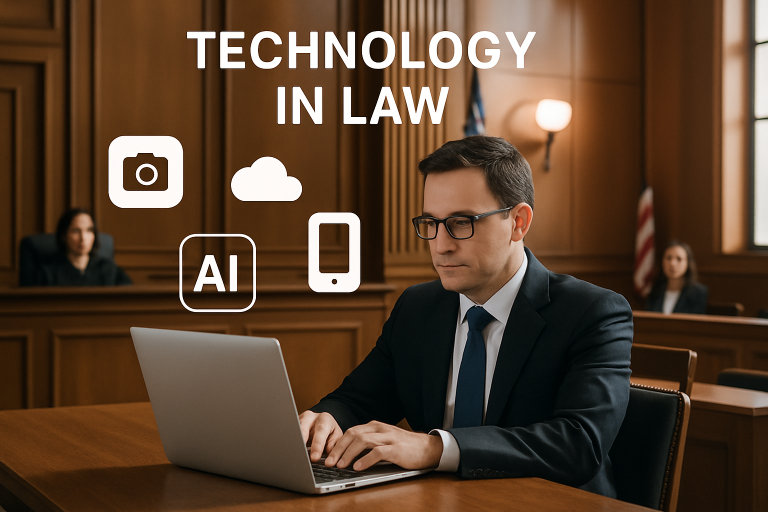How Advances in Technology Are Shaping Personal Injury Law
Discover how technology is transforming personal injury law. Learn trends shaping justice and why Phoenix attorneys leveraging tech offer vital support.

Introduction
Technology is no longer just a helpful addition to personal injury law—it is completely transforming the way attorneys, clients, and the courts handle cases. Whether it’s digital evidence or virtual consultations, these advancements are improving accessibility, efficiency, and the overall pursuit of justice. For victims seeking expert legal support, having guidance from skilled personal injury attorneys in Phoenix who understand today’s technological landscape is more crucial than ever.
Understanding how recent innovations are impacting personal injury law can help both legal professionals and everyday people protect their rights and interests. Below are the most influential technology trends and their impact on shaping this evolving field.
The Rise Of Digital Evidence In Personal Injury Cases
In the past, personal injury cases often relied on witness testimony or written reports. Now, digital evidence plays a central role in uncovering the truth. Dash cams, smartphones, and security cameras regularly document incidents with accuracy—digital records provide timelines, capture critical moments, and frequently resolve disputed facts in court. According to a recent overview from the American Bar Association, digital evidence is now introduced in nearly all types of injury cases, from car accidents to premises liability. This shift isn’t just about convenience; it’s about ensuring legal outcomes are based on clear, objective evidence.
How Artificial Intelligence Is Changing Legal Strategies
Artificial intelligence is revolutionizing the daily workflow and strategic planning among personal injury attorneys. AI-powered legal research tools can search and analyze thousands of documents, identify relevant case law, and even forecast likely case outcomes by evaluating historical data. This not only enhances the speed and accuracy of legal analysis but also reduces legal costs, making quality representation more affordable and accessible to clients. By integrating AI responsibly, law firms can allocate more time to high-value strategy and client care, while maintaining strong ethical standards.
Remote Legal Services And Virtual Consultations
The pandemic led to a dramatic increase in remote legal services, and this trend shows no signs of slowing down. Virtual consultations and video court hearings are appreciated for their convenience, efficiency, and ability to reach clients who otherwise face barriers such as disability, distance, or demanding schedules. Many courts have now made remote appearance options a permanent fixture, allowing attorneys and their clients to participate in vital legal processes from virtually anywhere. The rise in virtual services levels the playing field for those who might have struggled to obtain justice in the past.

Wearable Tech And Its Impact On Personal Injury Claims
Wearable health technology, from smartwatches to fitness trackers, is having a measurable impact on personal injury litigation. These devices track activity levels, heart rates, and sleep patterns—offering courts unbiased data about someone’s health before and after an accident. In some high-profile cases, data from fitness trackers has helped determine the validity of injury claims by showing whether a plaintiff’s lifestyle changed dramatically after the incident.
Data Privacy Concerns In The Legal Process
The influx of digital information in the courtroom has made data privacy an urgent issue for legal professionals and their clients. Confidential client communications and sensitive evidence must be carefully protected. Legal teams are adopting secure, encrypted platforms for case management and communication to prevent unauthorized access or leaks. Striking the right balance between demonstrating transparency in court and safeguarding client data is now considered an ethical imperative across the legal industry.
Efficient Case Management Through Technology
Modern law firms are embracing automated systems for document collection, e-discovery, and collaboration. Case management platforms organize everything from medical evidence to communication logs, ensuring critical deadlines aren’t missed and enabling attorneys to focus more attention on advocating for their clients. These systems also facilitate collaboration among attorneys, medical experts, and investigators, helping to expedite the resolution of complex personal injury cases.
Challenges Facing The Industry With the Adoption Of New Tech
While technological advances bring significant advantages, not every law firm or attorney adapts at the same pace. Cost, complexity, and concerns regarding cybersecurity create hesitancy among some legal professionals. Additionally, new tools and platforms require ongoing training to be used effectively and ethically. The industry as a whole is learning to strike a balance between enthusiasm for efficiency and innovation and caution to maintain the highest standards of client service and confidentiality.
Future Trends In Personal Injury Law
Looking ahead, technologies such as predictive analytics and blockchain verification are poised to transform personal injury law further. Analytics tools may soon predict case values or even help identify ideal strategies based on vast data sets. Blockchain could help verify the integrity of evidence and maintain transparent records of case proceedings. As technology continues to advance, legal professionals must commit to ongoing education and adapt their practices to serve their clients best.











